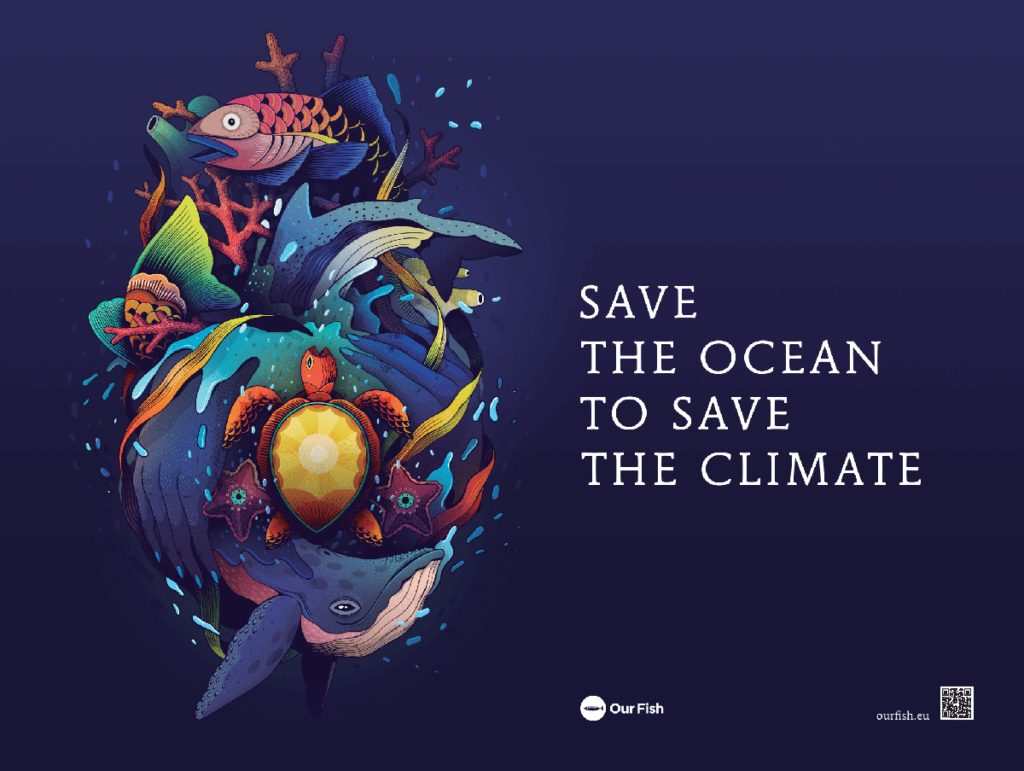
Brussels, 5 April 2022:- Reacting to the publication of the Intergovernmental Panel on Climate Change’s (IPCC) mitigation report, Our Fish Programme Director Rebecca Hubbard said [1]:
“UN Secretary General Antonio Guterres clearly captured the essence of the IPCC mitigation report by pinpointing the governments and corporations that continue to support the burning of fossil fuels as the dangerous radicals; it is morally and economically mad to prop up fossil fuels in the current climate emergency.” [2]
“For the EU this means fuel tax subsidies that perpetuate the most polluting and ocean-destructive fishing fleets must be ceased immediately, and a rapid transition to low-impact, low-carbon fishing must be supported instead.”
“These solutions are at hand, but we need EU leaders to act with courage to make them happen – yet by contrast, rumour has it that some EU Member States want to continue subsidising fuel for the fishing industry. Such a stance would put the EU Council in the same basket of liars that the UN Secretary General called out, for saying one thing and doing another”, added Hubbard. “Fishing subsidies distort markets, contribute to unfair trade practices, hinder international cooperation, increase CO2 emissions, and drive illegal and unsustainable fishing.” [3]
“Ending EU fossil fuel subsidies would be one of the most effective ways of reducing the size of destructive, industrial fishing fleets and reducing the overfishing that is depleting fish stocks and ecosystems. Rebuilding fish populations would enable marine ecosystems to function like a healthy body, ensuring they can cycle and sequester more carbon through the fish and the seabed, support more fishers that do not need to burn as much fuel to catch as many fish, and feed more people with less environmental impact.” [4]
“IPCC scientists are literally saying that incremental change is no longer an option – we need to pull out every single solution we have as fast as absolutely possible, and create or build up policies and laws to deliver action at scale. Unless our CO2 emissions peak by 2025, IPCC scientists predict we cannot limit global heating to less than 2.5 degrees; a world that is that hot will make our recent year of firestorms, floods, oil wars, fish stock collapses and the pandemic look like a walk in the park. It is simply horrifying.”
“This is an existential crisis; we must retool, restructure and revamp whole industries, including the fishing industry, in order to cut emissions by 65% by 2030 and limit warming to 1.5 degrees”, said Hubbard. “The EU must embrace the full restorative power of the ocean to help mitigate climate change. Fortunately, the EU can rapidly transition towards low-impact, low-carbon fishing, because we already have a bunch of solutions that can be delivered in the short term: end overfishing, prioritise access to the most sustainable fishers, phase-out destructive fuel-guzzling bottom trawlers, protect marine ecosystems, remove fuel tax subsidies in the revision of the Energy Taxation Directive, and invest in a decarbonisation strategy.”
“We echo UN Secretary General Antonio Guterres’ call to “demand an end to all fossil fuel subsidies”. The EU Council must finally listen to the science, the economics and the people, and end all fuel subsidies for the fishing industry in the revision of the Energy Taxation Directive in order to effectively accelerate the industry’s decarbonisation”, concluded Hubbard.
ENDS
Contacts
Dave Walsh. Our Fish Communications: press@our.fish, +34 691 826 764
Notes
[1] AR6 Climate Change 2022: Mitigation of Climate Change The Working Group III contribution to the Sixth Assessment Report
https://www.ipcc.ch/report/sixth-assessment-report-working-group-3/
https://www.ipcc.ch/report/sixth-assessment-report-working-group-ii/
[2] Secretary-General Warns of Climate Emergency, Calling Intergovernmental Panel’s Report ‘a File of Shame’, While Saying Leaders ‘Are Lying’, Fuelling Flames
https://www.un.org/press/en/2022/sgsm21228.doc.htm
Video:
https://www.youtube.com/watch?v=9xBVD8r0aHQ
[3] Report: Why Eliminating Fuel Subsidies from EU Fisheries is Good for Public Finances, the Marine Environment, and the Climate
[4] Briefing: Fisheries Management Responds to Climate & Nature Emergency
https://our.fish/publications/briefing-fisheries-management-responds-to-climate-nature-emergency/
EXTRACT:
Marine sediments form the largest pool of organic carbon on Earth, which is estimated to store about 38 trillion metric tons of carbon. The carbon stored by the top layer of marine sediments is nearly double the amount contained in all terrestrial surface soils. Every day, the ocean absorbs excess heat generated by humans and captures emitted carbon, which would otherwise have entered the atmosphere. Without the influence of the ocean, it is estimated the Earth would be 35 degrees hotter since the industrial revolution.
Both anthropogenic climate change and overfishing are destroying marine ecosystems and limiting the delivery of the ocean’s vital planetary functions. European waters have the highest fishing intensity in the world; they also contain one of the largest carbon sinks.
Recent evidence suggests fishing activities remove significant amounts of blue carbon from the ocean, releasing it into the atmosphere. Climate change is further accelerated through fuel consumption by EU fishing fleets, which account for nearly 7.3 million tons of CO2 emissions per year.
The fishing sector’s carbon footprint is further magnified when bottom trawling disturbs carbon retained in seafloor sediment. Dragging heavy nets along the seafloor re-releases CO2, which may have been sequestered for millennia.
Only effective management of European fisheries can help in both climate change mitigation and adaptation. The maintenance of healthy fish populations and marine ecosystems contributes to offsetting global warming and to ensuring the ocean can withstand the climate emergency. Ending overfishing in Europe and better management of the impacts of fisheries is key to rebuilding fish stocks and the improvement of marine biodiversity, in order to bolster such resilience.
